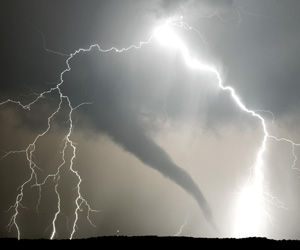 By Adam Korbitz, Government Relations Coordinator, State Bar of Wisconsin
By Adam Korbitz, Government Relations Coordinator, State Bar of Wisconsin
April 27, 2012 – The Wisconsin Supreme Court has adopted a new rule intended to streamline the provision of pro bono legal services following a major disaster, and has tentatively adopted another rules petition that will allow judges presiding over treatment courts to engage in ex parte communications.
The court held a public hearing on both petitions on April 25, 2012. Meeting in open administrative conference immediately following the public hearings, the court discussed and ultimately approved by a 7-0 vote Petition 11-07, which will amend Supreme Court rules by allowing out-of-state lawyers to practice pro bono temporarily in Wisconsin after a after a major disaster in Wisconsin. The rule will also allow such lawyers to provide legal services in Wisconsin related to the lawyer’s practice in a jurisdiction affected by a major disaster.
The petition, filed jointly by the Board of Administrative Oversight and the State Bar of Wisconsin, is patterned after a model rule adopted by the American Bar Association after Hurricanes Katrina and Rita in 2005. According to the petition, the new rule vests authority in the Supreme Court to determine when an emergency due to a major disaster exists. When the Court determines an emergency exists in Wisconsin, out-of-state lawyers may provide pro bono services under supervision of a court-approved program.
Likewise, when the highest court in another jurisdiction determines that an emergency exists in that jurisdiction, the Wisconsin Supreme Court may also make that determination. Under such circumstances, lawyers from the other jurisdiction may provide legal services in Wisconsin arising out of and reasonably relating to the lawyer’s practice in that jurisdiction.
Under the new rule, out-of-state lawyers practicing in Wisconsin will be required to register with the Clerk of the Supreme Court and Court of Appeals within 30 days of beginning to provide services and to notify clients of the authority and limitations on the authority to practice in Wisconsin. These lawyers will also be subject to the disciplinary authority of the Wisconsin Supreme Court.
According to Office of Lawyer Regulation Director Keith Sellen, who presented the petition to the court at the public hearing, 13 jurisdictions have adopted similar rules, 18 jurisdictions were considering similar rules, and six jurisdictions had decided not to adopt such a rule as of October 2011.
Ex parte communications in treatment courts
At the public hearing on April 25, the court also took testimony regarding Petition 11-09, which was filed by the Director of State Courts to amend SCR Chapter 60 to allow judges assigned to therapeutic or problem-solving courts (such as mental health courts, treatment courts, or veterans courts) to initiate, permit, engage in or consider ex parte communications that have been knowingly waived by participants.
During the open administrative conference that followed the public hearing, the court voted 7-0 to approve the rule change in concept, but asked the petitioners to submit a revised draft better defining the types of court dockets to which the rule would apply.
According to the petitioners, the purpose of the proposed rule change is to allow judges to assume a more interactive role with participants, treatment providers, probation officers, social workers and others working with such courts. In particular, the rule will streamline the participation of judges in multidisciplinary treatment team meetings, which are typically conducted off the record and out of the presence of treatment court participants. The rule will allow judges to take part in these meetings and exchange information without violating the ethical prohibition on ex parte communications.
The petition, which was based on ABA Model Rule of Judicial Conduct 2.9, was presented to the court by circuit court judges Elliott Levine of La Crosse, Kathryn Foster of Waukesha, and Lisa Stark of Eau Claire.
Continue to monitor WisBar.org and visit the State Bar’s Government Relations page for updated information on these and other budget issues.

Rotunda Report is the State Bar of Wisconsin’s Government Relations e-newsletter that highlights legislative, judicial, and administrative developments that impact the legal profession and the justice system. It is published twice a month and is distributed free to attorneys, public officials and others who help shape public policy in Wisconsin. We invite your suggestions to make the Rotunda Report more informative and useful and we encourage you to visit our website for the most current information about justice-related issues.
© 2012, State Bar of Wisconsin
